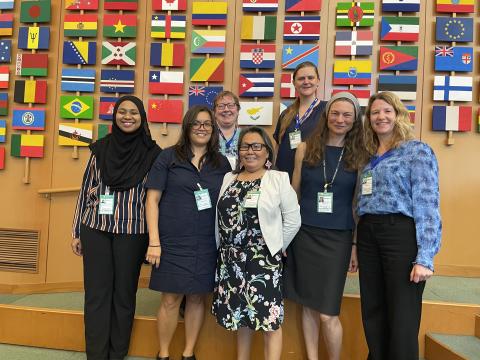UN Expert Committee Recommends Global Bans on Highly Toxic Chemicals

Members of IPEN with representatives from Pesticide Action Network, Inuit Circumpolar Council, and Alaska Community Action on Toxics
Two groups of toxic chemicals, the PFAS “forever chemicals” PFCAs and the class of plastics additives medium-chain chlorinated paraffins (MCCPs) meet the criteria for chemicals that should be globally banned, according to the Stockholm Convention’s Persistent Organic Pollutants (POPs) Review Committee (POPRC). Following its week-long deliberations, the Committee recommended the two chemical classes for global elimination and also moved the toxic pesticide chlorpyrifos forward in the process toward a global ban.
The approach to address groups of chemicals rather than individual substances is a positive step under the Convention [SB1] toward reducing risks of the tactic of hazardous (so-called “regrettable”) substitution, whereby industry replaces a banned highly toxic chemical with another closely related toxic substance.
IPEN´s Co-chair Pamela Miller said “It is encouraging to see these two groups of chemicals, PFAS and MCCPs, being recommended for global elimination, but we remain concerned about exemptions. To prevent the perpetuation of harm to workers and communities throughout the world, we remain opposed to exemptions that would allow continued used and production of these chemicals. As they are among the most dangerous chemicals known, they should be fully phased out as quickly as possible.”
“The Committee’s work this week resulted in several positive steps toward eliminating three types of [SB2] highly toxic chemicals,” said IPEN Science Advisor Sara Brosché, PhD. “Given the high volume and widespread use of the highly toxic pesticide chlorpyrifos, we are very glad to see this moving one step closer to a global ban.”
In addition to the chemical assessments, the POPRC adopted long-range environmental transport guidance[GU3] that identifies plastics as a vector for the global spread of toxic chemicals and commenced work on assessing options for improved transparency on highly toxic POPs chemicals in products and waste.
Long-chain perfluorocarboxylic acids (LC-PFCAs) are a group of PFAS “forever chemicals” used in personal care products, cleaning products, and in many grease- or stain-resistant products. Evidence shows exposure to LC-PFCAs are associated with adverse health effects including toxicity to the liver, thyroid, immune system, developmental/reproductive health, and altered cardiometabolic function. Medium chain chlorinated paraffins (MCCPs) are produced in high volumes and widely used in plastics and metal-working fluids and can adversely affect the liver, kidney, and thyroid gland. Safer alternatives for both chemicals are available.
Chlorpyrifos is a developmental neurotoxic insecticide that can cause reduced IQ, loss of working memory, and attention deficit disorders. It has been banned in several countries and US states. Organic and agroecological practices are safe substitutes for chlorpyrifos.
For more information, see IPEN’s POPRC 19 Quick Views.
